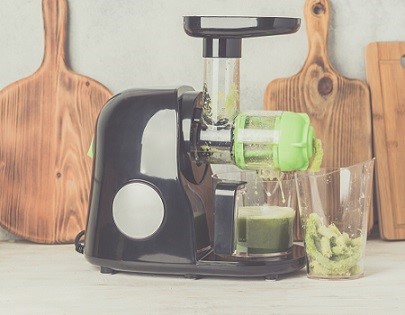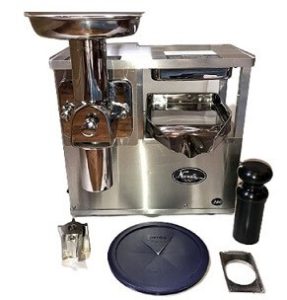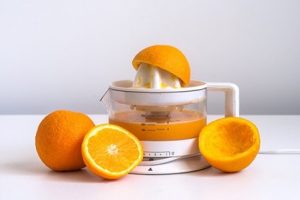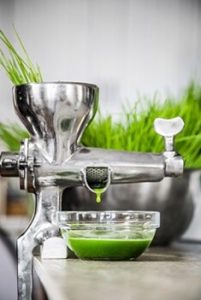Whether you’re getting started on your fitness journey or looking for additional kitchen appliances, juicers have become a staple in most modern kitchens. But not all juicers are made equal, most juicers available in India cannot extract juice from all fruits or vegetables. This is because the water content and consistency of the fruits and vegetables is very different from one another.
This is why many different kinds of juicers use different techniques to extract juice from the produce. Today, in this article we will discuss the major types of juicers which are available in the Indian market. If you are wondering what juicer is best for your frequent juicing needs then read along to find out.
Types of Juicers
1. Centrifugal Force Juicer:

Centrifugal force juicer gets its name from the centrifugal force which is the force felt by an object rotating in a circular motion from the centre and the force is exerted on the object from the centre.
In a centrifugal juicer, fruits or produce are ground against a spinning screen. This spinning screen is moving very fast to push the product against the screen that dissects it into tiny pieces which makes the juice. This type of juicer works very fast and is ideal for tougher fruits such as carrots or apples.
Advantages:
- Very easy to use
- Fast and you get the juice in a very little time
- They are the most commonly available juicers and are affordable
- You do not need to cut the fruits and vegetables beforehand
- It has a larger inlet tube which allows you to put bigger fruits and vegetables
Disadvantages:
- Produces a lot of heat which decreases the quality of juice and makes them foamy
- It also has 30% skin, pulps and other solid materials in the juice
- Are loud and might disturb people while operating
- They are not preferred for softer fruits such as mango, orange, kiwi etc as the juice will be very watery and will separate very quickly
2. Masticating Juicer:

Masticating juicers or slow juicers produce higher quality juice than centrifugal juicers. They imitate biting or chewing motions to extract the juice. This is done with the help of an auger that crushes the food using small and sharp teeth.
Advantages:
- They do not heat the juice which gives a higher quality juice
- They are suitable for green, leafy vegetables and softer fruits
- The yield of juice is higher than centrifugal juicers
- You get more nutrients in your juices
Disadvantages:
- You need to cut the fruits and vegetables beforehand because the inlet nozzle is smaller
- They require a longer time to produce the juice
- They are bigger and bulkier and will require more space than the centrifugal juicers
- They are also expensive
- The cleaning process after juicing is a hassle with these types of juicers
3. Triturating or Twin Gear Juicer:

Twin gear as the name suggests has two gears or augers. In this type of juicer, the produce is crushed between the two augers and pushed through a narrow screen to filter out the juice. This type of juice has fewer pulps than centrifugal or masticating juicers.
Advantages:
- The juice produced is of high quality with fewer pulps and solids
- Can multi perform to do other functions like making baby food or nut butter etc.
- You can use this juicer for both hard and soft fruits and vegetables
- They are quiet and will not create as much noise as the centrifugal juicers
Disadvantages:
- They are costlier than centrifugal or masticating juicers
- Require more counter space as these are bigger
- The juice will still have pulps and solids
- The cleaning process is a hassle
4. Hydraulic Press:

Hydraulic juicers as the name suggests uses hydraulic force to extract the juice out of fruit. Here the juicer exerts extreme pressure in order to compress the juice out of the fruit. There are generally two steps involved in the process, one is two dissect the fruit into small pieces and the second is to apply strong pressure on the fruit that extracts the juice. They perform remarkably well in producing high-quality juice with minimum pulp. The juices extracted by hydraulic juicers are packed with nutrients and minerals.
Advantages:
- The quality of the juice is better than other juicers. The juice has minimum pulp content and high vitamins & mineral content
- The juice produced also has a longer shelf life
Disadvantages:
- They are big and bulky and require quite a lot of space to store
- They are expensive and difficult to clean
- It requires more time to extract juice than the other two juicer
5. Manual:

Manual juicers are the juicers that require you to extract juice physically. They have a funnel-like inlet pipe where you insert the fruit or vegetable and push the lever like contraption to extract the juice. They do not require any electricity and are generally small in size which makes them portable.
Advantages:
- They are small and portable
- They are very inexpensive
- They are easy to clean after juicing
- They do not require electricity so they will not add to your electricity bill
- They also produce good quality juice as they do not use excessive heat to extract the juice
Disadvantages:
- They require effort to operate
- Generally, you can extract juice from one or half a fruit at a time which makes them quite time-consuming
- The juice contains quite a lot of pulp and solid bits
- They are also not suitable for all fruits and vegetables, only some citrus fruit juices can be extracted using them
6. Pulp Ejecting:

In most cases, juicers store the pulp accumulated during juicing within themselves whether on top of a thin sieve or in a separate compartment. Then, they are removed when you clean the juicer after use. But in a pulp ejection juicer, the pulp and the solid materials are not stored inside the juicer, they are thrown out of the machine from an outlet. This makes it possible for you to juice more produce without having to frequently clean the juicer.
Advantages:
- You can extract more juice in a single go
- You do not need to clean the juicer frequently
- The juice will have a minimum amount of pulp and solids
Disadvantages:
- They are generally expensive than normal juicers
- Not suitable for people who prefer pulp in their juice
- The output is not much different from other low pulp juicers like hydraulic juicers
7. Citrus Juicer:

Citrus juicers are smaller and compact juicers that are designed to extract the juices of pulpy citrus fruits like orange, lemon, grapefruits etc. They can also be used to extract fruits of similar texture like kiwi, watermelon etc. These juicers can be either electric, handheld or manual type.
Advantages:
- They are cocktail and citrus juice, enthusiasts
- Smaller and portable than hydraulic, centrifugal and masticating juicers
Disadvantages:
- Limited usability, cannot be used with multiple fruits and vegetables
- Smaller and cannot extract a lot of juice in a single go
- The quality of juice largely varies depending on the type of the citrus juicer i.e. manual, handheld or electric
8. Wheatgrass Juicers:

Wheatgrass juicers are unique types of juicers that are designed specifically for wheatgrass juice extraction. This is because wheatgrass is not a fruit or vegetable and does not have heavy pulp. They cannot be extracted using the normal method of juicing because that will blend them into a mushy pulp instead of juicing them. Wheatgrass juicers use a high force, low-speed method to press the juice from the wheatgrass.
Advantages:
- They can extract juice from low water content grasses
- They are generally inexpensive
- Small and portable design
- They are generally made up of high quality and durable material
- Does not use heat to extract the juice which retains all the minerals and nutrients of the wheatgrass
Disadvantages:
- Limited usability, cannot be used for a lot of fruits and vegetables
- They are generally manual in design which requires quite a lot of effort to extract the juice. This makes it very hard to extract a large amount of juice in a single go
Conclusion:
The juicer you choose should be based on what fruits and vegetables you regularly juice. You should also look at factors such as pulp content and heat application. If you enjoy pulp in your juice then you do not need an extreme pressure juicer that filters out all the pulp. Similarly, if you are focused on the nutrient and mineral content of the juice then you should avoid heat-generating juicers such as centrifugal juicers. In the end, it all depends on your requirements and preference.